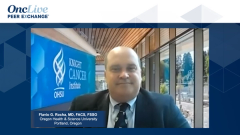
Advanced Biliary Tract Cancers: First- and Second-Line Chemotherapy
Focused discussion on chemotherapy treatment options commonplace in patients with advanced or metastatic biliary tract cancers.
Episodes in this series

Transcript:
Milind Javle, MD: Let’s talk a little about management of biliary tract cancer in the clinic with chemotherapy. Mark, if a patient comes to you, you’re going to have a discussion of the role of first-line chemotherapy. What do you expect? What do you do after this chemotherapy stops working? How do you approach it? What’s your discussion with the patient about the efficacy and toxicity of the therapy at a high level?
Mark Yarchoan, MD: At a high level, biliary tract cancers are clearly aggressive cancers. Unfortunately, they tend to be more resistant to treatment than many other cancers, but we have clear evidence that chemotherapy can prolong survival in this cancer. Before 2010, we borrowed chemotherapies from other tumors. Because this was such a rare cancer, there weren’t major studies establishing a standard of care. This is old news but in 2010, the ABC-02 study randomized patients to gemcitabine-cisplatin vs gemcitabine alone. The addition of cisplatin prolonged life by about 3 months over what gemcitabine did by itself. Since 2010, gemcitabine-cisplatin has been the backbone of first-line chemotherapy. Until recently we told our patients that survival with gemcitabine-cisplatin was about a year on average. Of course, some patients are above and below the average. Gemcitabine-cisplatin is the closest thing we’ve had to a standard of care for cholangiocarcinoma until this year. We’ll talk about new developments.
Milind Javle, MD: Thank you, Mark. What’s your practice in the second-line setting?
Mark Yarchoan, MD: We’ll talk a little more about targeted therapies, but all patients should undergo molecular subtyping. There’s a one-third chance you’ll find something that’s immediately actionable. In those cases, a biomarker-indicated therapy would usually come in the second line. For the majority of patients who don’t have something actionable, we have 2 standard therapies for second line, either FOLFOX [5-fluorouracil, leucovorin, oxaliplatin] or FOLFIRI [5-fluorouracil, leucovorin, irinotecan], or 5-FU + liposomal irinotecan. Both therapies are supported with randomized trial data showing a small but meaningful prolongation of overall survival. In my clinical practice, more patients get 5-FU–liposomal irinotecan. Coming off first-line therapy, patients often have neuropathy, so it’s nice to give them a nonplatinum option.
Milind Javle, MD: Wonderful.
Transcript edited for clarity.












































